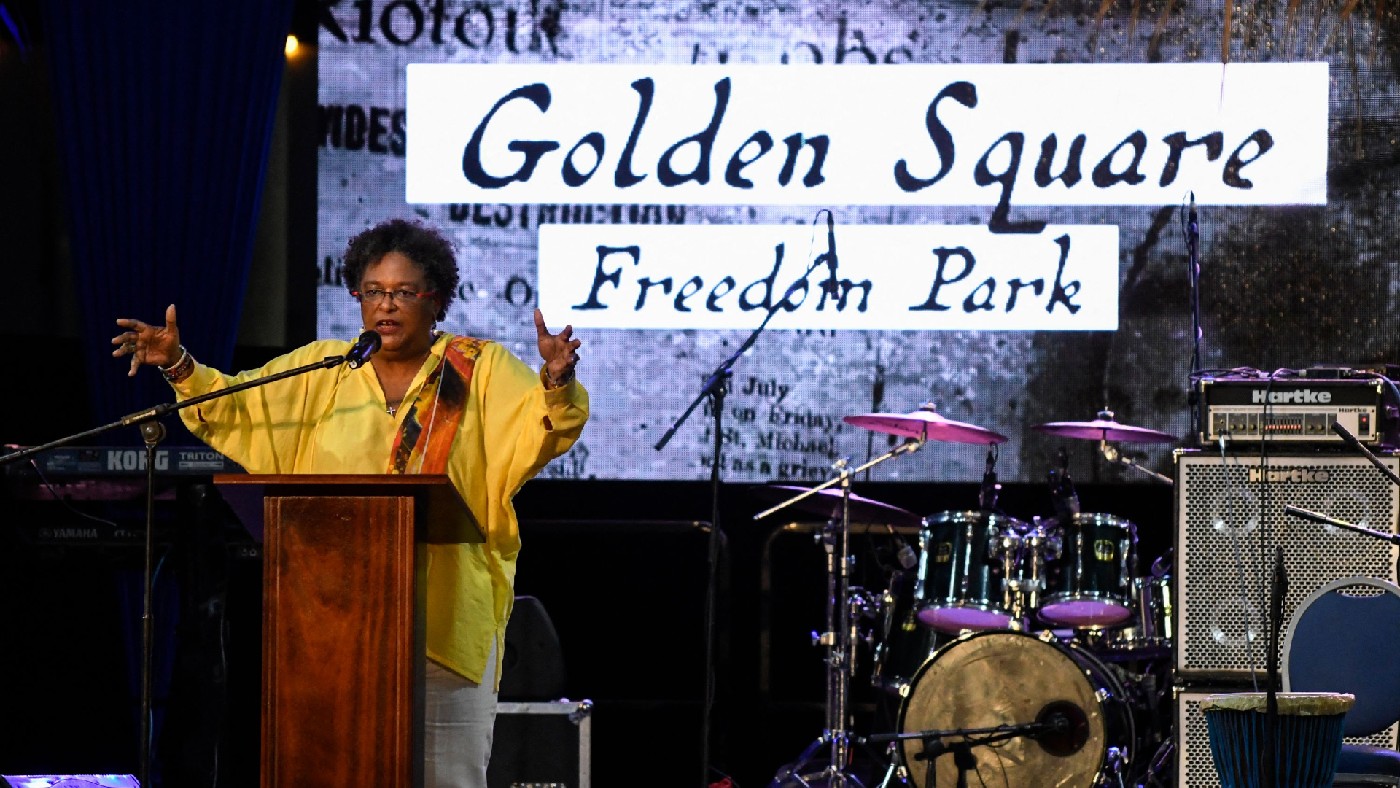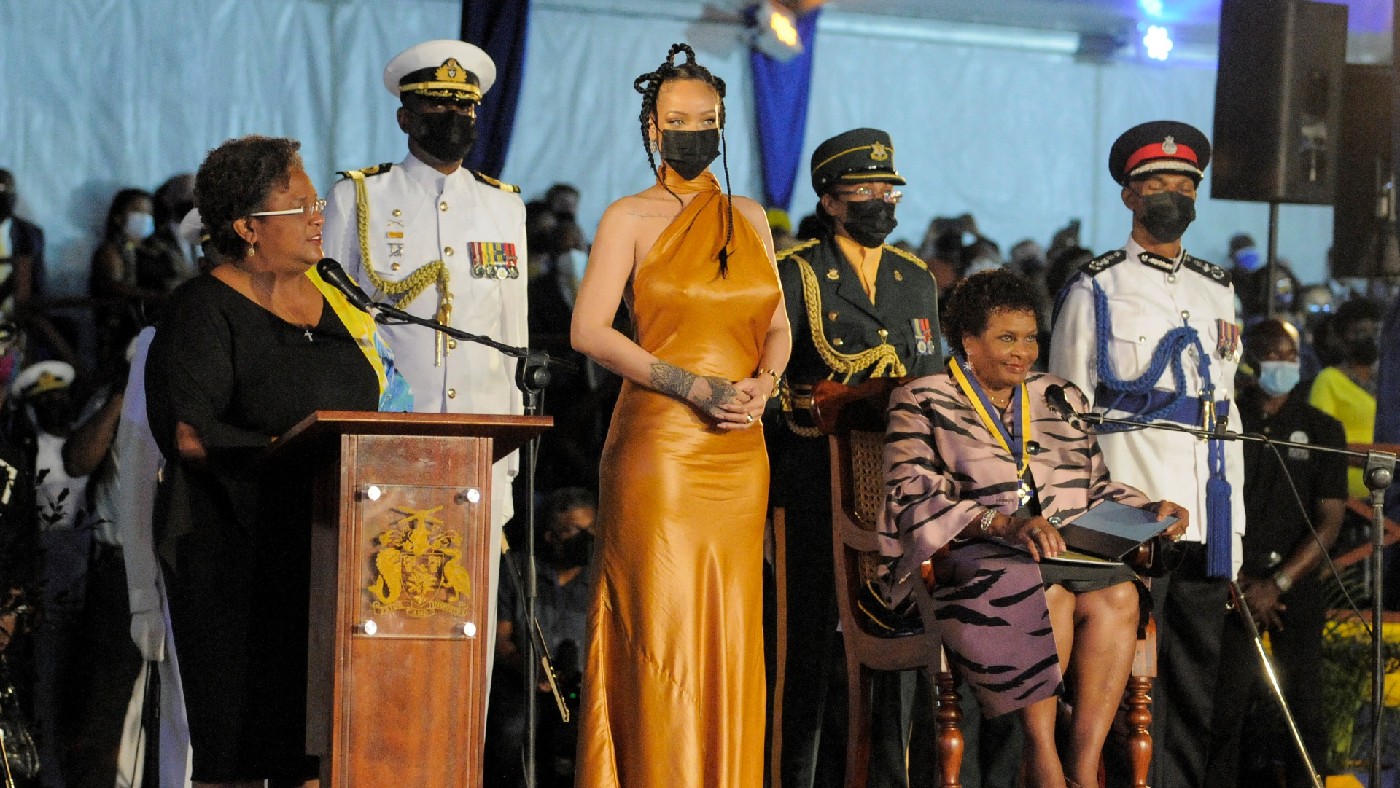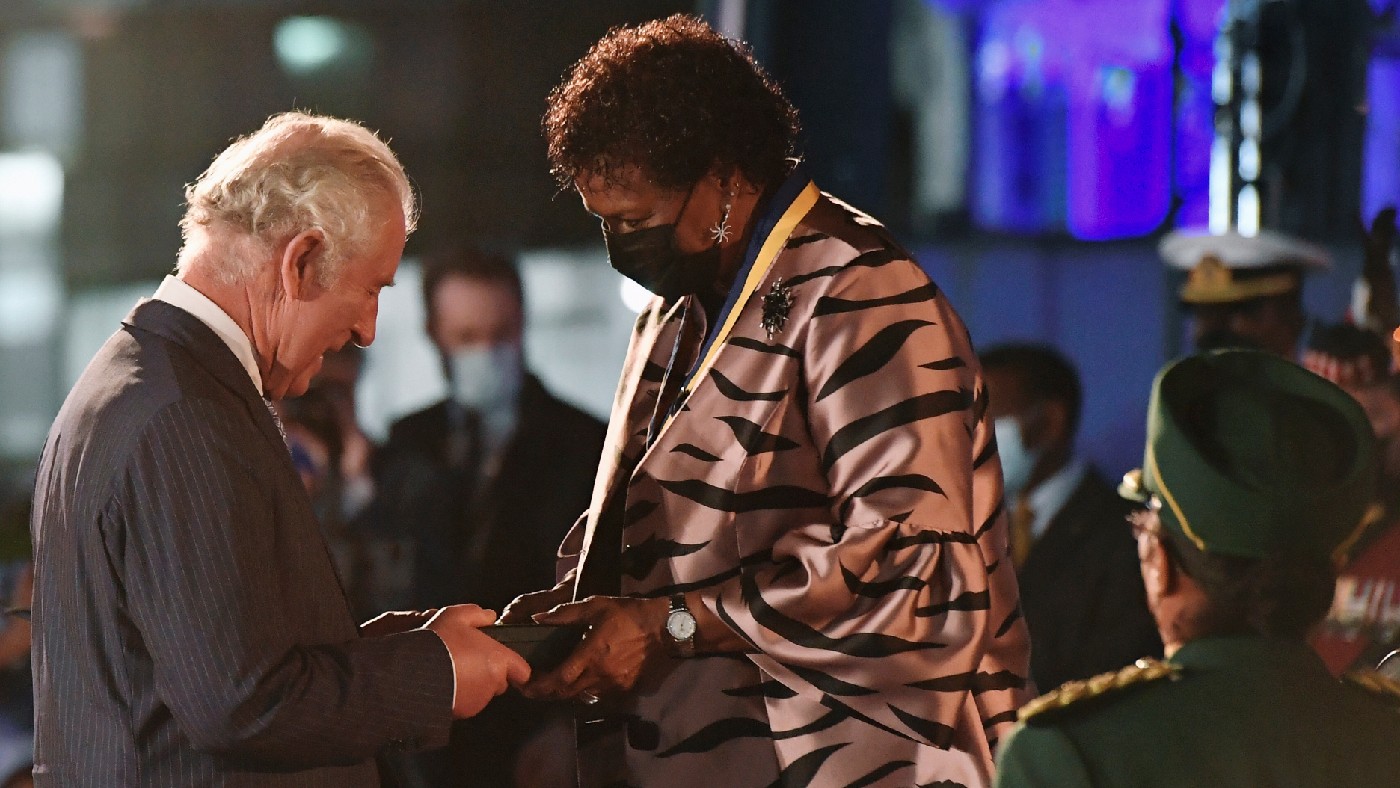What next for Barbados as it becomes a republic?
Island’s transition from realm to republic is ‘seminal moment’, said PM Mia Mottley

A free daily email with the biggest news stories of the day – and the best features from TheWeek.com
You are now subscribed
Your newsletter sign-up was successful
Barbados transitioned from a Commonwealth realm to a republic as of midnight local time today, marking the 55th anniversary of the Caribbean island’s independence from Britain.
Prime Minister Mia Mottley described the move as a “seminal moment” that will see the nation of 300,000 people leave its colonial past behind.
An overnight ceremony in Bridgetown, the capital, was attended by notable figures including Mottley, Barbadian singer Rihanna, Prince Charles and inaugural president Sandra Mason, who has replaced the Queen as the country’s head of state.
The Week
Escape your echo chamber. Get the facts behind the news, plus analysis from multiple perspectives.

Sign up for The Week's Free Newsletters
From our morning news briefing to a weekly Good News Newsletter, get the best of The Week delivered directly to your inbox.
From our morning news briefing to a weekly Good News Newsletter, get the best of The Week delivered directly to your inbox.
“Barbadians want a Barbadian head of state,” Mason argued back in September 2020, when the government first announced its intention to cease being a constitutional monarchy, The Guardian reported
In a statement published today, the Queen said that she was “very pleased” that her son was there to mark the historic occasion. “The people of Barbados have held a special place in my heart,” she said. “It is a country rightfully proud of its vibrant culture, its sporting prowess, and its natural beauty, that attracts visitors from all over the world.”
Barbados is the first Commonwealth realm in nearly three decades to declare itself a republic. In 1992, 24 years after gaining independence, the Indian Ocean island nation of Mauritius was proclaimed a republic but remained in the Commonwealth, which will be the case for Barbados too.

Demands for slavery reparations
A free daily email with the biggest news stories of the day – and the best features from TheWeek.com
Today’s transition had been debated for years, but “gained momentum amid the Black Lives Matter movement in the United States and growing demands for reparations for slavery on the island”, said The Washington Post.
According to The Independent’s race correspondent Nadine White, who has been reporting from Bridgetown, campaigners had planned to stage a protest demanding slavery reparations during Prince Charles’s speech, but had been forced to cancel it by the country’s government.
“A lot of us don’t understand why the prince is here if we’re really pulling away from the colonial power,” co-organiser Marcia Weekes told White. “Why haven’t we heard any talk about reparations despite the PM creating a whole arm in the government to deal with that issue?”
Given Barbados’s history, it is “no surprise” that the island “has been at the centre of the debate about reparations”, wrote Zeinab Badawi in the Financial Times. The legacy of slave owners on the island is apparent, she continued, adding that “white Barbadians account for about 2.5% of the 280,000 population but they own most of the island’s productive land”.
Calls for an apology
Alongside demands for reparations, some campaigners have been calling on the Royal Family to apologise for the role of its ancestors in the slave trade.
In his speech at the official ceremony, Prince Charles stopped short of an apology but formally acknowledged “the appalling atrocity of slavery” in the Caribbean, remarking that “it forever stains our history”.
Many had criticised Mottley’s decision to include the Prince of Wales in the ceremony, with some protesters describing it as an “insult” to Barbadians because of the Royal Family’s links to colonialism, said The Telegraph.

Will other countries follow suit?
Barbados is not the first former British colony in the Caribbean to forsake the Queen. Guyana took that step in 1970, Trinidad and Tobago followed suit in 1976 and Dominica did the same two years later.
It’s also unlikely to be the last. Over the years, there has been a “long-running debate” in Jamaica over whether it should also turn away from the monarchy, said The Guardian.
On Monday, Jamaican Prime Minister Andrew Holness announced that the island’s constitution would undergo a major review next year. Both of Jamaica’s main political parties support cutting ties with the monarchy completely.
Referring to Barbados, Guyana, Trinidad and Tobago, and Jamaica, The Independent’s White tweeted: “Of the ‘big four’ countries in the Caribbean community, this week Jamaica will be the only one that isn’t a republic.”
And outside the Caribbean, a movement to drop the Queen as head of state has been growing in Australia too. Speaking on CNN from Bridgetown on Monday, reporter Max Foster said he thought that “Australia is probably top of the list”, along with Jamaica, as the next country to become a republic.
According to the i news site’s chief foreign commentator Michael Day, Australians have “a love-hate relationship with the British”, with 45% of them voting to become a republic, and 55% against the idea, in the most recent referendum, in 1999. “Who says results won’t be reversed in a future poll?” Day concluded.
Kate Samuelson is The Week's former newsletter editor. She was also a regular guest on award-winning podcast The Week Unwrapped. Kate's career as a journalist began on the MailOnline graduate training scheme, which involved stints as a reporter at the South West News Service's office in Cambridge and the Liverpool Echo. She moved from MailOnline to Time magazine's satellite office in London, where she covered current affairs and culture for both the print mag and website. Before joining The Week, Kate worked at ActionAid UK, where she led the planning and delivery of all content gathering trips, from Bangladesh to Brazil. She is passionate about women's rights and using her skills as a journalist to highlight underrepresented communities. Alongside her staff roles, Kate has written for various magazines and newspapers including Stylist, Metro.co.uk, The Guardian and the i news site. She is also the founder and editor of Cheapskate London, an award-winning weekly newsletter that curates the best free events with the aim of making the capital more accessible.
-
 The environmental cost of GLP-1s
The environmental cost of GLP-1sThe explainer Producing the drugs is a dirty process
-
 Nuuk becomes ground zero for Greenland’s diplomatic straits
Nuuk becomes ground zero for Greenland’s diplomatic straitsIN THE SPOTLIGHT A flurry of new consular activity in the remote Danish protectorate shows how important Greenland has become to Europeans’ anxiety about American imperialism
-
 ‘This is something that happens all too often’
‘This is something that happens all too often’Instant Opinion Opinion, comment and editorials of the day
-
 Epstein files topple law CEO, roil UK government
Epstein files topple law CEO, roil UK governmentSpeed Read Peter Mandelson, Britain’s former ambassador to the US, is caught up in the scandal
-
 Iran and US prepare to meet after skirmishes
Iran and US prepare to meet after skirmishesSpeed Read The incident comes amid heightened tensions in the Middle East
-
 Israel retrieves final hostage’s body from Gaza
Israel retrieves final hostage’s body from GazaSpeed Read The 24-year-old police officer was killed during the initial Hamas attack
-
 China’s Xi targets top general in growing purge
China’s Xi targets top general in growing purgeSpeed Read Zhang Youxia is being investigated over ‘grave violations’ of the law
-
 Panama and Canada are negotiating over a crucial copper mine
Panama and Canada are negotiating over a crucial copper mineIn the Spotlight Panama is set to make a final decision on the mine this summer
-
 Why Greenland’s natural resources are nearly impossible to mine
Why Greenland’s natural resources are nearly impossible to mineThe Explainer The country’s natural landscape makes the task extremely difficult
-
 Iran cuts internet as protests escalate
Iran cuts internet as protests escalateSpeed Reada Government buildings across the country have been set on fire
-
 US nabs ‘shadow’ tanker claimed by Russia
US nabs ‘shadow’ tanker claimed by RussiaSpeed Read The ship was one of two vessels seized by the US military